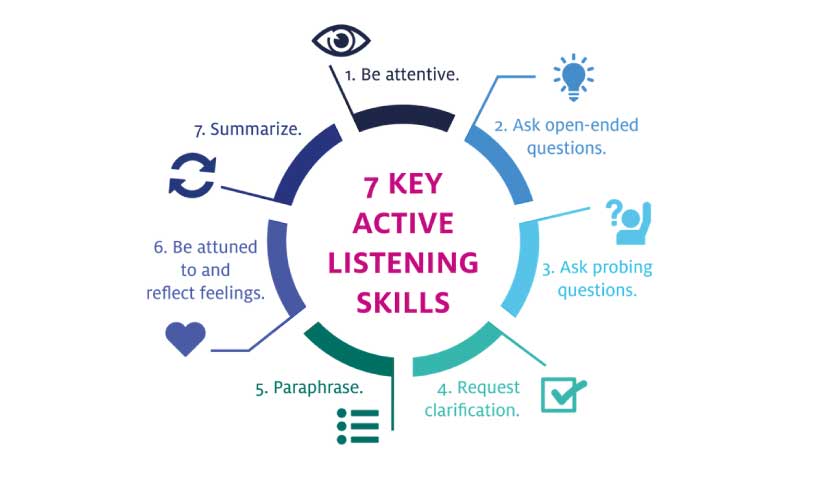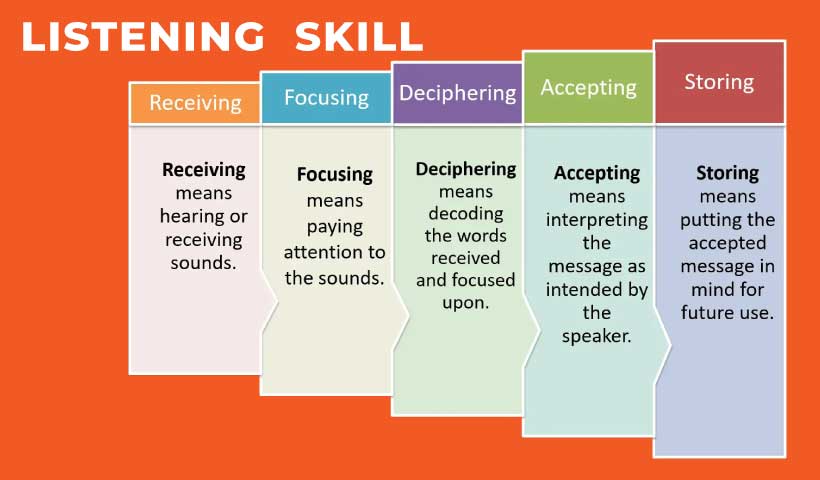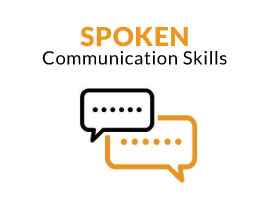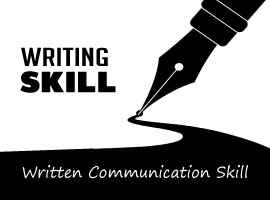Listening is one of the most powerful methods of all effective communication. Communication breaks down because of poor listening skills. So listening is a skill of communication one should aim to be proficient for effective communication.
Listening skills play a very significant role in communication to keep pace with today's modern world. Keep reading this explanation to learn more about listening communication: what it is, its importance, the advantages, and disadvantages of listening communication skills, what is active listening, various types of listening, listening strategies in communication, listening barriers in communication, and examples of listening communication skills.
Listening communication definition
Generally in the communication process, the ability to properly understand and interpret the meaning of what the other person says is called listening.
Whether it may be conscious or sub-conscious mind people are always hearing. But listening is the process that is done by the choice of the listener. It is such a kind of interpretative act that a person took to understand.
But there is a subtle difference between listening and hearing. A semiotician, Roland Barthes, characterized the distinction between listening and hearing. "Hearing is a physiological phenomenon; listening is a psychological act."
Importance of Listening Communication
The process of communication has two parts. One is expressing your feelings, thoughts, and ideas and the other part is listening to others. Most of us are good speakers but in the second part sometimes, the successful speakers fall short!
The importance of listening skills in communication is inevitable. However, Listening can be very hard sometimes. Because this skill comes naturally to few people and others have to achieve it. However, why is listening so important that one should achieve this skill? Well, here are some reasons.
• Reduces misunderstanding
Poor communication is a result of poor listening. Moreover, listening half can lead to misunderstanding. The time you do not listen to the full, you may be wrong in making an assumption that can lead to a serious misunderstanding.
It is very common to mishear or misunderstand someone's thoughts and feelings when you are not listening to others properly. Listening carefully lessens the chance of misunderstanding.
• Trust building
When you pay attention to listening to someone, they understand your interest. They can inform you that you are invested in what they are saying.
Your attention-mixed listening makes them more comfortable in sharing with you. If you are not paying attention, making any eye contact, or glancing at your phone, the other person will not want to waste their breath. They will not consider you to recognize their mind and feelings.
• Improves communication skills
The skill of listening is highly important in interpersonal communication as it helps us to understand what the other person says and to take their perspective. The capability of listening carefully is highly recommended for healthy relationships, fruitful discussions, and tremendous outcomes at work.
• Shows engagement
Though it sounds something strange, however, listening indeed shows your engagement with others. It is not listening that shows your engagement it is the way you listen. The manner you show when listening tells how you treat the opposite person.
Listening is a massive part of how we communicate – it is not only staying quiet so that others can talk. By turning into a better listener, you may enhance your communication talents and set up yourself as a powerful communicator in all spheres of life, personal and professional.
• Conflict elimination
Poor listening skills are one of the main reasons for many conflicts. Not listening carefully often leads to misunderstanding and thus creates conflicts. All the time you don't have to say yes but just acting that you are listening can makes the situation calm.
• Improves relationships
Listening improves the relationship with each other. When you listen to someone carefully, it helps to make a strong bond between you too. The other person feels special when you show your extraordinary listening skill to them.
• Increasing productivity
Listening is very important in the matter of increasing the level of your productivity. Because recent research says that people who are good at listening can perform well. A good listener can retain information, easily comprehend what they are told to do, and can ask for the proper direction. Listening is a vital skill in teamwork and group meetings.
• Improves leadership skills
Being a good listener is one of the prerequisites of a good leader. Active listening helps enable your connections with your subordinates, pay attention to distinct perspectives, and reduce misunderstanding. Therefore, if you are trying to end up a good leader, you must end up a good listener.
• Building empathy
Humans are empathetic naturally but their upbringing and experiences make them biased and bold. Moreover, sometimes the assumptions may prove wrong. In that case, you could decide to listen instead of assuming. When you listen properly from a source, you will have deeper information from their perspective, which is most important to having empathy.
• Limits judgments
Listening can limit judgments. When you carefully listen to someone, you put your entire attention into the conversation. As a result, you place an effort to understand what the other person is telling and cast off judgmental thoughts. You, therefore, pay attention to the speaker with a broader mind due to the fact they are supplying you with their perspective.
• Improves problem-solving skills
Listening can develop your problem-solving skill. Active listening leads you to make the perfect decision and proper solution. In problem-solving listening plays an exceptional role. From spotting trouble to its implementation, you need to pay attention to clear up issues effectively.
• Better understanding situation
Listening is indispensable for recognizing wrong in a situation and then identifying what to do approximately with it. It may be as easy as spotting that the character you're speaking to seems stressed and wishes for greater information, or as complicated as identifying what happens when you don't comply with your instinct that a supplier's product is probably inferior.
• Develop critical thinking skills
Listening develops the level of your capability to think critically. You only develop this skill by practicing more. And on the other hand, the more you listen to others' thoughts; it will be much easier for you to establish your thoughts and ideas.
• Helps to change your perspective
Well, this is one of the most important things about listening. Your proficiency in listening can even change your perspective. When you listen to something very carefully and give all your attention to it you may find something that you don't know before or things that you know were wrong. After a chapter of active listening, you may find resources to change your perspective and thoughts about some issues.
• Keeps you out of troubles
Only listening can keep you far from trouble. Focus on the words and the tone is one of the prerequisites of active listening. So learn to listen to what the other says. This could make your relationship happier and keeps you far from problems.
• Connecting people
You can connect with more people and make new friends with the blessings of listening. Those who are good listeners can connect with more people than those who are not.
• Promotes co-operation
If you make them feel that person that you're paying attention to and respect him/her, the person will reply positively. This can lead to better collaboration with the listener and mutual respect. This can imply a positive effect on communication in your group and organization and result in a nice and effective work environment.
• Learn new things
In this modern time, if you want to learn something, you may easily find resources on the internet. But, there is still something that you may achieve only by listening to others. So listening is equally important to learn new things.
• Helps make a better decision
You can level your position high or low by making a decision. And a good listener can make quality full and speedy decisions more than others. Those who listen to other people carefully can gather information and ideas that are the main keys to taking a good decision.
Active Listening Communication
As the term declares, active listening means listening actively. Active listening is a communication skill that requires your entire engagement and focusing on what the other person is telling and finding out the inner meanings and thoughts of the conversation.
Effective communication has two parts. One is speaking and the other is listening. Active listening is a manner of listening that gives feedback to the other person that develops mutual understanding. It is one of the most important steps to defuse the situation and search for answers to problems.

Two types of signs indicate how much you are active in this conversation. These are
1. Verbal signs of active listening
• Positive attitude: Though showing a positive attitude is a robust sign of attentiveness, the listener should be careful while using positive verbal reinforcement. Although a few fine phrases of encouragement may seem helpful to the speaker. The listener should use them carefully so that they don't cause any kind of distraction or disturbing to the speaker and shows pointless emphasis on parts of the message.
• Remembering: It is our instinct habit that we often cannot remember details, mainly for any duration of time. However, remembering some magnet points can establish that the messages are actively listened to and understood. Remembering details, thoughts, and ideas from preceding conversations proves that the listener is holding the interest and thus the speaker is probably inspired to say more.
• Ask a question: The listener can show that he/she is listening carefully by asking a question with an open end. This type of question can keep the flow of the conversation and the speaker feels free and comfortable when sharing. By asking the relevant question the listener can show his/her interest in what the speaker says.
• Reflection: Reflecting is carefully repeating or paraphrasing what the speaker has stated so that it can expose comprehension. Reflection is an effective talent that may substantiate the message of the speaker and exhibit understanding.
• Clarification: Clarifying includes asking questions of the speaker to make sure that the listener can understand the appropriate message. Clarification commonly entails the usage of open questions that allows the speaker to explain particular points if requires.
• Summarization: Repeating a summary by the listener is one of the verbal signs of active listening. In this way the listener repeating of what the speaker has said in their own words. Summarizing entails picking the main points and interpreting them in a more logical and precise way and giving the speaker opportunity to correct them if requires.
2. Non-verbal signs of active listening
• Smile: A smiling face can do much more thing than a sad face. Keep a smile on your face because it is one of the most important parts of non-verbal signs of active listening. When your smile is combined with nods of the head it will be more powerful and the speaker makes feel that you are listening only to him/her.
• Eye contact: Eye contact is another sign of active listening. The listeners are encouraged to make direct eye contact with the speaker so that the speaker feels that the listener listens to him/her and tries to understand his/her feelings. However, direct eye contact is sometimes uncomfortable for shy or introverted speakers but it is important for active listening.
• Posture: Posture can show the interaction between the speaker and the listener. The attentive listener tends to lean barely ahead or sideways even as sitting. Other symptoms of actively listening might also consist of a mild slant of the top or resting the top on one hand.
• Distraction: The active listener is never distracted by fidgeting, looking at a clock or watch, doodling or playing with their hair, or picking their fingernails.
• Reflection: Automatic reflection of any facial expressions of the speaker is a sign of active listening. These reflective expressions expose the sympathy and empathy of the listener to the speaker. But consciously attempting the mimic facial expression may be a sign of inattention.
Listening Strategies in Communication
When learning a new skill everyone has to go through a difficult and unknown way out of his or her comfort. However, if they find some short techniques then the learning seems very easy and fun. Here's a short list of active listening strategies in communication-based on the information discussed in more detail above.
1. Pay attention
It will be a disgrace for you when someone asks you something and you could not answer when he already talked about it. It is because as a listener you did not pay your full attention to the speaker. Always pay full attention when you are listening to someone. Let go of objects that can distract your thoughts and body and consciously practice mindfulness.
2. Ask question
Ask relevant questions makes the conversation fruitful and shows your attention to the speaker. If you can't understand what the speaker has said, wait for a pause from the speaker and then ask the question.
3. Listen with empathy
When you listen to someone, try to listen with full empathy. This term requires us to recognize, accept and understand the best we can and so are others. You have to put yourself in the other man's shoes and give him/her the benefit of doubt. Try to understand the meaning of what the speaker says and deal with him/her with kindness. Ask what problems the other person is experiencing intending to assist. Concentrate on their body language. And never try to jump to a conclusion.
4. Do not interrupt
Interruption is always irritating. It leads the speaker to frustration and it lets the speaker feels that you are not interested in what he/she said. However, if you are a quick thinker, please, let yourself slow down to thinking so fast.
Moreover, one more thing, a pause for a few times does not mean that they finished talking and you can jump in. No, please do not think so. A few times silence can mean that the speaker wanted to take some time to share or him or her just trying to hide their feelings.
5. Do not judge
Please do not judge someone's feelings and thoughts when you are listening to him/her. Listen to him/her with full of respect and sympathy.
6. Keep an eye on body language
Focus not only on the verbal cues but on the non-verbal cues too. The facial expressions, body language, gestures, and tone of voice can tell a lot. Keep a keen eye on how they smile, how they keep their arms, how their eyes say etc.
7. Do not jump to the conclusion:
When you listen to someone always try to listen with your whole heart and time. If you have a hurry then make an apology for this but do not jump to the conclusion on your own. Try to focus on the speaker and let him/her conclude.
8. Do not impose your own opinion
It is a bit tough but not impossible to keep your opinions to yourself. It is sometimes annoying when someone shares something with you and you impose your own opinion upon him or her. So keep your opinion and ideas to yourself until him/her asked.
Types of Listening Communication
Listening is one of the methods of communication skills. There are several types of listening communication and each method applies to different circumstances. Here is the list of the main types of listening.
1. Informational listening
Informational listening, often known as informative listening is the form of listening people use when they want to learn something. This type of listening requires your full concentration, critical thinking, and acceptance of responsibility to understand new concepts. Informational listening puts less effort into emotion rather than critical thinking and following a logical series as it is far communicated. When you attempt to learn important skills and it seems difficult to you then you must pay attention and use informational listening skills.
2. Comprehensive listening
Comprehensive listening is a type of listening skill that develops in early childhood. This type of listening skill requires basic language skills and vocabulary to recognize what the speaker says. Comprehensive listening covers the other form of listening skills that critical listening employs. In everyday life, people use the combination of comprehensive listening with verbal cues to understand what messages are delivered to them.
3. Discriminative listening
Discriminative listening is the very first listening skill that a baby is born with. These basic types of listening require not only understanding the words but also understanding the tone of voice and the way the speaker says. Baby does not understand the words but they rely on the discriminative listening skill to understand the tone of voice and in what mood they are communicating.
As an adult, you rely on your discriminative listening skill when you are surrounded by people of a foreign language and you do not even understand what they are talking about. However, you cannot understand the language but you could depend upon the tone of voice and inflection to derive a vague meaning. The mannerisms, facial expressions, and frame language of a speaker assist in cluing you into the speaker's message.
4. Sympathetic listening
Sympathetic listening is important when you want to build a good relationship with someone in your life. These types of listening are driven by emotion. Sympathetic listening focused on the emotion and feelings of the speaker instead of the words he/she says.
5. Biased listening
Biased listening is also known as selective listening. In this type of listening, the listener does not listen fully to the speaker but listens to only the information he/she wants to hear. Biased listening is different from critical listening because the listener is not fully engaged with the speaker rather he/she is trying to affirm previously held biases. However, most of the time people even do not know that they use a biased listening process. This type of listening process can be the reason for a distortion of facts.
6. Therapeutic or empathetic listening
Among all the types of listening skills, the most common is therapeutic or empathetic listening. In this type of listening process, the listener tries to understand the thoughts and feel the feelings of the speaker. The listener just put him/her directly in the shoe of the speaker to feel what the speaker says. This listening skill is more involving than sympathetic listening skills. Empathetic listening skill builds trust and positive interaction in a relationship.
7. Critical listening
The term 'critical' has many meanings but when it is used in listening the term 'critical' means that when you listen to something, you are evaluating the data but do not judge unnecessarily. Critical listening refers back to the technique of listening that listeners use when trying to compare and interpret the complexity of the facts being conveyed to them.
8. Full listening
When the listener pays full attention to the conversation, it is called full listening. In this type of listening the listeners' main goal is to fully understand what the speaker says. During the conversation, the listener may take a few moments of silence to summarize and paraphrase what he/she hears is right or wrong. Moreover, when the conversation is over the speaker and the listener together end as they both understand the conversation. This type of listening skill is required to understand a lecture or any kind of presentation in your work or school.
9. Deep listening
Deep listening is more attached and involved than full listening. The aim of this type of listening is the ultimate mutual understanding between the speaker and the listener. The listener has to pay deep attention to what the speaker says for many cues. However, these cues can include body language, figuring out biases and preferences, identifying goals, and perceiving values and beliefs.
10. Time-oriented listening
In this type of listening style, the listener is interested in time and deadlines. These types of listeners are sometimes rude and impatient as they are always concerned with timeliness and time limits. These types of listeners hold very short attention. They are always in a hurry to hear the message quickly without any unnecessary details.
Time-oriented listeners' main point is time. As they want to make the maximum use of their time, they may regularly inform the speaker how long they may be taking note of their message!
11. People-oriented listening
Another type of listening is people-oriented listening. People-orientated listeners are inquisitive about the speaker's background and beliefs. They frequently ask questions about what motivates the speaker and their dreams or desires. They also are worried about the statistics and figures.
12. Action-oriented listening
There are other types of listening called action-oriented listening. They only appreciate compact and error-free messages. They experience lists and are very fast to identify inconsistencies.
Action-oriented listeners are very curious about the matter of asking for clarification from the speaker. They also keep an eye on the emotional aspects and attempt to understand the message as simply as it can be. Ultimately, this method can result in miscommunication and misunderstandings
13. Partial listening
Partial listening is a type of listening in which the listener intends to listen to the speaker but is distracted by something. These types of listening impact the listeners' ability to answer a question or follow instructions depending on the conversation.
14. False listening
False listening is that type of listening in which the listener pretends to listen but actually, they are not. The listener shows that they are listening by smiling and nodding their head. This type of listening affects your professional life.
Advantages of listening communication
The advantages of listening communication skills are immensely wide and their importance in our workplace and personal betterment is massive. But what are the advantages of listening communication? Here is the answer.
• Helps to understand others
Listening helps you to understand the problems and feelings of others. You should know the feelings, thoughts, needs, and problems of your surrounding people and listening helps you in this regard.
• Wins respect
How do you feel when someone listens to you with full attention? You feel respected, right? Yeah, listening can give you respect as a listener as well as a speaker.
• Defuses anger in others
One of the great advantages of listening communication is that this skill can defuse the anger in others, when we listen to an angry person.
• Makes you intelligent
Listening makes you intelligent. When you listen to people from different spheres, you will surely learn different aspects.
• Makes you more competent
Listening is the way to get more knowledge. And the more you know, the more you will do better in your life.
• Tells you what's going on
Life is an ongoing learning process. And one of the most effective learning processes is listening. Things are always happening around us and we gather knowledge personally and professionally.
• Keeps out of trouble
Listening keeps you far from any trouble which is most important in our personal life. When you listen to someone or something carefully, it will reduce the chance of misunderstanding and above all keeps you out of trouble.
• Bring love into your life
Listening to someone with full interest can show your love and care for the person.
Listening process in communication
Listening is such a process that does not have any concrete start and finish. Like the rest of the other communication systems, listening has cognitional, behavioral, and relational components.
The models of listening processes are informative and they visualize particular components but one thing should be kept in mind the visualization cannot portray the speed, overlapping nature, or common complexity of the overall system in action. Well, the 5 tiers of the listening process are receiving, interpreting or understanding, recalling or remembering, evaluating, and responding or feedback.
• Receiving
Receiving is the first step of listening communication. It is the intentional recognition of listening to a speaker's message, which occurs when we filter various resources so that we can isolate the message and keep away from the complicated combination of incoming stimuli.
• Understanding or comprehending
The next level of listening is comprehending or understanding. The listener understands what the speaker has attempted to convey. This activity can be described as absorbing, grasping, or assimilating. To understand the meaning of the message, the listener makes use of his knowledge, experience, notion, and cognitive power.

• Remembering or recalling
In the process of listening, remembering is that step where the assimilated message is saved in memory to speed up future recall.
• Evaluating
When we assess something, we make a judgment about its credibility, completeness, and worth. From the point of credibility, we attempt to determine the degree to which we believe the statements of the speaker are accurate or not. From the point of completeness, we attempt to 'read among the lines' and compare the message when it comes to what we realize approximately the subject or state of affairs being discussed. We compare the value of a message and by our senses come to a judgment about whether we think that the message or concept is good/bad, right/wrong, or desirable/undesirable. However, not all these elements of judging and evaluating something are instinctual; you should develop this with your own personal and intellectual development.
• Responding or feedback
The most important thing in completing a listening process is responding. Generally, responding may take place at the end of the conversation when the speaker has almost done it and he/she has nothing more to share. However, if the listener has to clarify or search for something he/she may respond earlier. Moreover, quick responding means that the listener carefully listens and can understand what the speaker wants to share.
Listening barriers in communication
Listening barriers are which makes interrupt the conversation. It is highly recommended that the listener pays his/her full attention and understands what the speaker says. And if there is any sort of interference or false impression between the speaker and the listener, the communication may go wrong.
The factors that are considered the most important barriers to effective listening are given in the following.
• External barriers
1. Noise
Noise is number one on the list of listening barriers. Exotic noises interrupt the total listening process. Noise from machinery, traffic, and public chaos are the barriers to effective communication.
2. Visual distraction
Visual distraction may be a reason for listening barriers. If a listener looks through the window or starring at the nearby road, he/she can never pay full attention to the speaker's words.
3. Physical setting
Uncomfortable places and weather, inappropriate arrangements of sitting, bad odor, and distance between the speaker and the listener can affect effective communication.
4. Objects
Objects, such as pens, jewelry, and even the dress of the speaker can distract the mind of the listener. Strange, huh? However, it is true.
5. Speaker
Yes, you read the right word. Sometimes the speaker him/herself is the barrier to effective listening. The haircut and color, the appearance, the manner, and the gestures of the speaker can be the reason for distraction.
• Internal barriers
1. Anxiety
The listener's anxiety is one of the internal reasons for an effective listening barrier. If the listener is panicked, he/she can never concentrate on the conversation.
2. Self-centeredness
This causes the listeners to pay more attention much on his/her thoughts and beliefs rather than the speakers' feelings and concerns.
3. Mental laziness
Lazy people are worse at listening. Their laziness makes them unwilling to listen to any complex or detailed information.
4. Boredom
If the listener is bored about anything he/she won't feel interested in the speaker's subject matter which affects effective listening.
5. Superiority complex
A superiority complex is one of the barriers to active listening communication. If the listener thinks that he/she knows everything and he/she has nothing to learn from the speaker then the conversation may go wrong.
6. Cognitive dissonance
The listener only listens to what he/she wants to hear from the speaker that complies with his or her thoughts and beliefs.
7. Impatience
A restless person can never be an active listener. If the listener cannot hold his/her patience with the speaker then it may lead an ineffective listening.
• Physical barriers
1. Speed of speech
The speed of speech of the speaker is one kind of physical barrier to active listening communication. If the speaker speaks too fast then the listener may not understand properly. On the other hand, if the speaker speaks too slowly, the conversation turns monotonous.
2. Voice tone
The tone of voice of the speaker also creates a barrier to effective listening. Commonly, the same tone may receive in different ways by different people.
3. Physiological barriers
It is very hard to concentrate on something when your health condition does not cooperate with you. It is a bit uncomfortable to be attentive in a conversation when you are not feeling well or suffering from an injury or an illness or bodily stress. Sound health condition is one of the prerequisites of active listening communication.
• Psychological and emotional barriers
Psychological and emotional barriers relate to behavioral aspects. The speaker's attitude, the listeners' ability to understand, personal anxiety of both the speaker and the listener are in the bag of psychological and emotional barriers which are the reason for unproductive listening communication.
• Language barriers
A language barrier is the most common barrier to listening communication. When two people are communicating, it is very common that them to have different accents and different native languages. And when language is the problem then any communication is sure to be failed.
• Cultural barriers
Cultural barriers are the most important barriers to active listening communication. When people have specific differences in their backgrounds, religion, culture, and ethic, it could create cultural limitations that make it hard to pay attention effectively to listening.
• Making assumptions
When the listener assumes what the speaker said, he/she may not fully concentrate on what the other person says.
• Time pressure
When the listeners feel pressed for time, it becomes difficult to pay full attention to the speaker. Feeling the pressure of time means, the listener's ability to actively listen is interrupted.
• Too much information
Do not make your conversation overload with information. Too much information is a barrier to effective listening. If you see that the listener doesn't seem to be listening to you. Please don't take it otherwise. It may a reason that you give too much information and your listener has reached his/her limit in taking new information.
• Interruption
Interruptions from both can create a barrier to listening. The listener can interrupt by frequent questioning and the speaker does this by allowing environmental distractions that seize the interest of the listener and take them off track from the related topic.
Listening communication examples
Here is an example of active listening communication. Here different kinds of active listening strategies are used. Let's have a look.
Speaker: I am sorry to disturb dump you, but two days ago, I had a fight with my brother, and we have not spoken since. I am very upset. I do not know what to do or who to talk to.
Listener: No problem dear! I am here. (sympathy). Tell me more about what happened. (open-ended question)
Speaker: Well, we were talking about what to do for our granny's birthday. She turns 70. However, he argued with me. I am still so angry.
Listener: Oh, that is tough. You sound upset and angry that you are not speaking because of it. (reflecting what was heard)
Speaker: Yes, he just makes me so angry. He assumed I would help his plan this elaborate party—I do not have time! It is as if he couldn't see things from my perspective at all.
Listener: Wow…. that is too bad. How did that make you feel? (another open-ended question)
Speaker: Disappointing. Frustrated. Angry. Now I feel a little bit guilty that he had all these plans, and I was the one holding them back. Finally, I told him to do it without me. But that's not feeling okay. We wanted to make it together.
Listener: Well, it sounds complicated. I think you need some time to sort out how you feel about it. (withholding judgment)
Speaker: Yes, I guess I do. Thanks for listening—I just needed to vent.
Conclusion
The importance of listening communication skills is indispensable. Listening is a skill and not everyone is born with it. As listening skills are important for active and effective communication, everyone should learn and develop them for the betterment of their workstation as well as to build a good relationships with others in their personal life.








